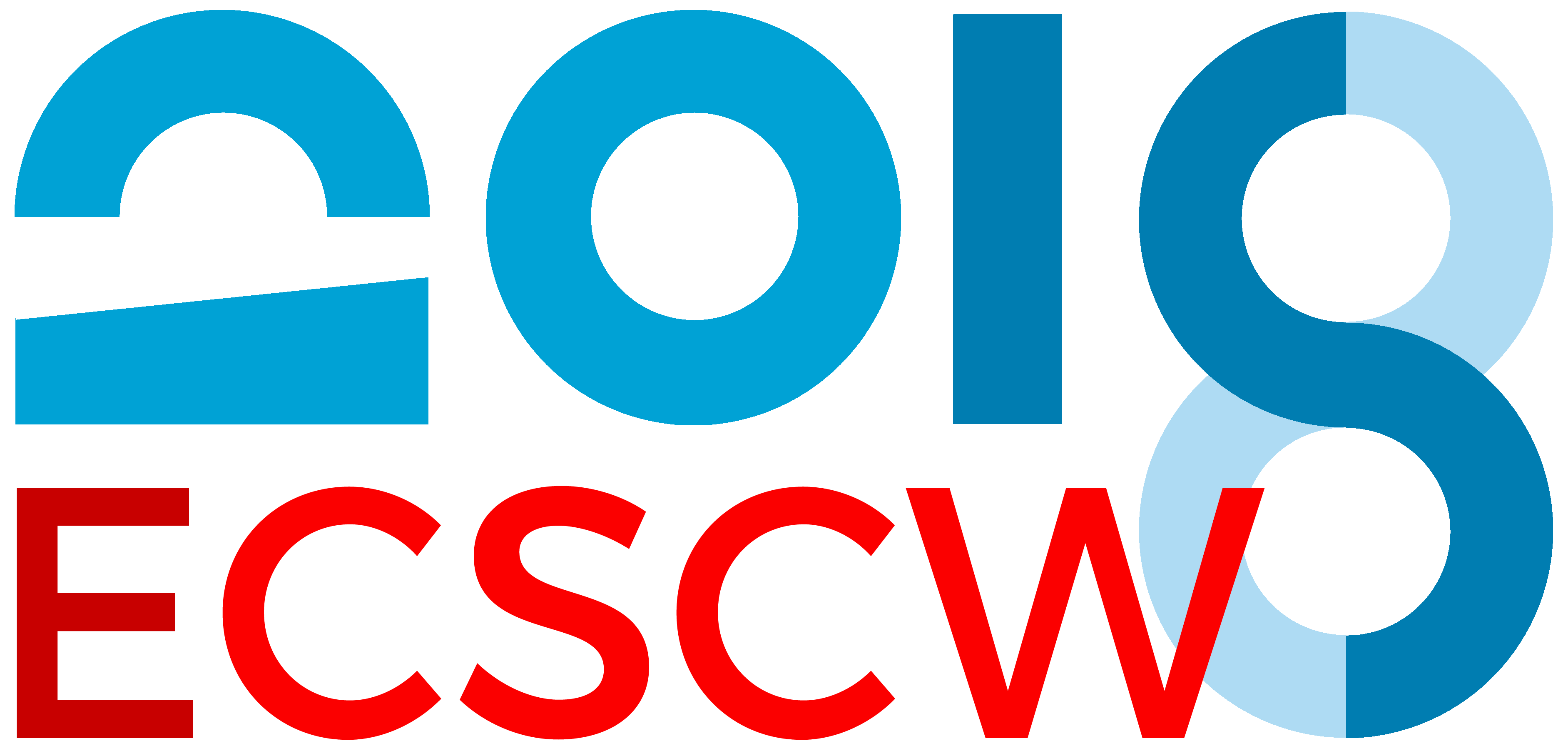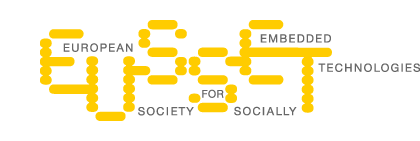Three masterclasses have been accepted at ECSCW 2018. They will take place on Monday, June 4, 2018.
Key research issues in CSCW
As a research area, CSCW was formed in response to the early development and use of collaboration technologies, as researchers from different disciplines and in different contexts began to try to understand the potentials and issues of these new technologies. As a result, CSCW was from the outset a rather heterogeneous area, spanning not only computer science and social science but also a manifold of distinctly different research paradigms. In important ways, CSCW is still characterized by such heterogeneity, not least because new collaborative technologies, made possible by underlying technological advances in distributed computing, give rise to new potentials and issues, and also because collaborative technologies become applied in new work domains and related use contexts. But at the same time, in the midst of this heterogeneity, a research program has been articulated and developed that attempts to build, from the bottom up, a conceptual framework for our understanding of the design and use of collaboration technologies in actual work practices. The critical issue in this effort is to be able to transfer those findings to other settings as lessons learned. This issue, in turn, makes it crucially important to clarify the key concepts (such as ‘work practice’, ‘coordinative artifact’, ‘technique’ and ‘technology’, ‘infrastructure’) in terms of which findings are compared.
The master class will give an overview of the main themes of CSCW research and will focus on the problems of clarifying the key concepts of CSCW.
Organiser: Kjeld Schmidt
Kjeld Schmidt holds a doctoral degree in sociology and is Professor (em.) of Organization, Technology and Work at Copenhagen Business School, Denmark, and Senior Professor at the University of Siegen, Germany.
Kjeld Schmidt has been involved in the research area of Computer-Supported Cooperative Work (CSCW) since the 1980s and has played a key role in defining the field. His research primarily focuses on the conceptual foundations of CSCW research.
He is the author of Cooperative Work and Coordinative Practices (Springer 2011). In addition, he has published 70+ peer-reviewed journal articles, conference papers, and book chapters and has co-edited 23 books and 4 special issues. Kjeld Schmidt has been Editor-in-Chief of the international journal Computer Supported Cooperative Work (CSCW) since its launch in 1992 and has at the same time been centrally involved in organizing a large number of CSCW conferences.
Design Ethnography
This masterclass builds upon and continues a strong trajectory of masterclasses at ECSCW that have focused upon the use of ethnography and qualitative methods in the context of design (cf. previous masterclasses and tutorials conducted by Dave Randall and Mark Rouncefield almost since the very beginning of ECSCW).
The masterclass will begin by working from the premise that there is a range of observational strategies that might be adopted to examine various aspects of human practice for the purposes of design. The class will start off by looking at how the interest in understanding human practice first arose in systems design, notably at Xerox PARC and the Centre for CSCW at Lancaster University. It will also briefly look at the sociological and anthropological origins being drawn upon within design when engaging in studies of human practice, especially in so much as these have resonated on into existing approaches to ethnography. The central part of the class will examine and discuss some of the principal approaches to observing what people do that have become a part of the HCI and CSCW landscape. It will also assess the various pros and cons that might be seen to attach to these various approaches and invite discussion of what these approaches might ‘mean’ for the would-be ethnographer. The third part of the class will examine practical approaches to conducting design ethnography on the ground and will draw upon the presenter’s personal experience to explicate what it takes to do ethnography for systems design in detail. The final part of the class will discuss the presentation of study outcomes in ways that are relevant for design, again drawing upon the organiser’s own background in having to do this to serve a variety of disparate interests.
This will be a half-day masterclass that will be divided into four core sections:
- The antecedents of ethnographic approaches in design
- Alternative ways of approaching observations of human practice for design
- The application and pursuit of ethnographic approaches on the ground
- The articulation of findings for design
At the conclusion of each section there will be time devoted to Q & A for attendees to discuss certain elements in more detail.
Organiser: Peter Tolmie
Peter Tolmie has worked as an ethnographer and ethnomethodologist on numerous CSCW and HCI-related projects since 1997. He started his career at the Centre for CSCW at Lancaster University, before being recruited to work as a Research Scientist at Xerox Research Centre Europe’s Cambridge laboratory in 2000. He has therefore been closely involved in the development of ethnographic approaches in the CSCW community and is considered one of the senior figures in the field. He moved to XRCE’s sister laboratory in Grenoble in 2002, where he became Area Manager of the centre’s Work Practice Technology Group before becoming a freelance consultant in 2006, working on projects in both academia and industry. He became a Senior Research Fellow in the Mixed Reality Lab at the University of Nottingham in 2010 and moved to the University of Siegen in April 2017, where he is now Principal Research Scientist in the Information Systems and New Media group.
He has conducted a wide range of ethnographic studies for design across numerous domains over the years, including: small businesses; home environments; gaming and mobile-based artistic experiences; musical performance and music production; secretarial work; outdoor leisure pursuits; museums and galleries; the TV and film industries; bid management; healthcare professionals treating breast cancer; and journalism. He has also been published widely in both journals and conferences in the domains of Computer-Supported Cooperative Work, Ubiquitous Computing and Human-Computer Interaction, is the author and co-author of a number of books that explore the relationship between ethnographic work and design, and is an active reviewer for many of the major computing conferences and journals and regularly serves as an associate and sub-committee chair.
Practice-based Computing as the Heart of CSCW Research
Since its advent, the CSCW field of research has been concerned with making computer science more relevant to societal problems in the real world. In particular, CSCW researchers have been trying to grasp a better understanding of the relationships between societal change and technology design, especially on a micro level, so to design meaningful IT artefacts to support the actors involved in specific tasks. Put it in another way, practice-based computing has been consistently at the heart of CSCW research, with researchers pursuing design-oriented investigations on the often-complex interaction between social practices and the design of IT artefacts. With the progress of the years, a new research paradigm has been developed, based on a set of theoretical, conceptual and empirical commitments. The concept of “practice” and, not least, practice-based computing, has been central and instrumental to this research paradigm. Many and various scholars have been influential to this movement, which has shaped and been shaped by the interests of the CSCS field.
This master class targets young researchers, interested in a design-oriented understanding of the concept of social practice and its meaning to CSCW. Drawing on many and various design interventions, also known as Design Case Studies, it will demonstrate how socially embedded applications of information technology challenge and change practices, thus requiring the elaboration of design practice artefacts that allow for anticipating use practices and evaluative methods which afford grasping the inspirational creativity of such practices. It will introduce Design Case Study as a research framework to accomplish such a design-oriented understanding of social practices, to develop innovative useful and usable technology and investigate its appropriation in the wild. Finally, it will engage participants in this intellectual and emotional challenge, which has been gearing CSCW research and prepare them to contribute to it.
Organiser: Volker Wulf
Volker Wulf is Professor of Cooperation and Media Systems at the University of Siegen and Managing Director of the School of Media and Information (iSchool) of the same university. In addition to that, he is the Head of the Business Field of User-oriented Software Engineering (USE) at the Fraunhofer Institute for Applied Information Technology (FhG-FIT) in Sankt Augustin. He is also member of the CHI Academy, being elected for the position due to his outstanding research contributions to the CHI and CSCW fields of research.
He holds a double degree in Computer Science and Business Administration from the RWTH Aachen and the University of Paris VI, and PhD from Dortmund University. His studies have been followed by a number of visiting and deputy professorships at the Universities of Hamburg and Freiburg. After completion of his Habilitation degree at the Faculty of Computer Science of the University of Hamburg, he spent a research stay at Massachusetts Institute of Technology (MIT). As a Fulbright Scholar, he spent a sabbatical semester at the University of Michigan, Ann Arbor, and Stanford University, Palo Alto, in 2006/7. Since 2011 he has officiated as Dean of Faculty III (School of Economic Disciplines) at the University of Siegen.
His research interests lie primarily in the area of IT system design in real-world contexts. This includes the development of innovative applications from the areas of cooperation systems, knowledge management and community support. One special focus lies on flexible software architecture which can be adapted by end-users. Further research focuses on methods of user-oriented software development and introduction processes.
Volker Wulf is author of more than 250 publications, which have been internationally peer-reviewed. These include the books Expertise Sharing: Beyond Knowledge Management and Social Capital and Information Technology (MIT Press Cambridge MA); End User Development (Springer Dordrecht); and, more recently, Socio-Informatics: A Practice-Based Perspective on the Design and Use of IT Artifacts (Oxford University Press).
Masterclasses call for papers (closed)
Masterclasses will offer a small number of participants the opportunity to learn about specific CSCW concepts, methods and techniques from recognised experts. The topic of a masterclass can be quite specific and the class will typically be small so to encourage in-depth discussion. These masterclasses are particularly targeted at early career researchers and PhD students, but they are open also to other participants if places are available.
Masterclasses will take place on Monday, June 4
See the list of masterclasses at ECSCW 2017: https://ecscw2017.org.uk/masterclasses/
Master classes may be for half-day or full-day sessions. Master class proposals should be no more than 3000 words, and should include a description of the theme(s) of the master class, the background of the organiser(s) and the maximum number of participants.
Submissions should be sent per email at ecscw2018-workshops-masterclasses@inria.fr. Please follow the exploratory papers template for your proposals. The template can be downloaded as RTF, MS Word or Latex.
Important dates:
-
Monday, March 5, 2018EXTENDED TO Monday, March 26, 2018: Submission deadline - Monday, April 2, 2018: Notifications due to authors
- Monday, June 4, 2018: Masterclasses
Questions or comments can be sent at: ecscw2018-workshops-masterclasses@inria.fr




